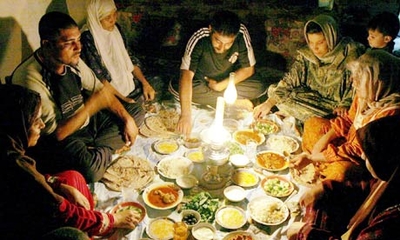|
Please take a moment to visit and log in at the subscriber area, and
submit your city & country location. We will use this information in
future to invite you to any events that we organize in your area.
Islam's Inadvertent Patterns
W.T. title: "Islam's inadvertent
adverse effects on adherents: Strict traditional laws impact modern
life"
How does Islam shape the way Muslims live? The religion's formal
requirements are the narrow base for a far wider structure of patterns that
extend the formal rules of Islam, stretching them in unexpected and unplanned
ways. A few examples:The Koran strictly bans the consumption of pork, leading to the virtual disappearance of domesticated pigs in Muslim-majority areas, then their replacement by sheep and goats. These latter overgrazed the land which led, as the geographer Xavier de Planhol observes, to "a catastrophic deforestation" that in turn "is one of the basic reasons for the sparse landscape particularly evident in the Mediterranean districts of Islamic countries." Note the progression from Koranic dietary injunction to the desertification of vast tracts of land. The scriptural command was not intended to cause ecological damage, but it did. Islam's unattainably high standards for governmental behavior meant historically that existing leaders, with their many faults, alienated Muslim subjects, who responded by refusing to serve those leaders in administrative and military service, thereby compelling rulers to seek personnel elsewhere. This led to their systematically deploying slaves as soldiers and administrators, thereby creating a key institution that lasted a millennium from the eighth century.
Those scriptures also imbue a hostility toward non-Muslims which in turn generates an assumption about non-Muslims harboring a like hostility toward Muslims. In modern times, this projection has created a susceptibility to conspiracy theories which have had many practical consequences: for example, because only Muslims worry that anti-polio vaccinations secretly render their children infertile, polio has effectively become a Muslim-only scourge in 26 countries. The annual pilgrimage to Mecca, the Islamic hajj, began in the seventh century as a local custom that then became an international meeting that facilitated the transfer of everything from Islamist ideas and political movements (the Idrisis of Libya) to luxury goods (ivory) plants (rubber to Southeast Asia, rice to Europe), and diseases (meningococci, skin infections, infectious diarrheal and blood-borne diseases, and respiratory tract infections, including perhaps the brand-new MERS-CoV).
The daytime fast during Ramadan often leads observant Muslims to exercise less and to "tend to overeat upon breaking their fast, and usually the meal involves heavy, fatty foods that are high in calories," notes the head of the Emirates Diabetes Society. One survey in Jidda, Saudi Arabia, found 60 percent of respondents reporting excessive weight gain after Ramadan.
With regard to women, injunctions about mahram protection by male relatives, and a vastly lower social and legal status combined to create such inadvertent patterns as physical seclusion, obsession with virginity, honor killings, female genital mutilation, and (Saudi-style) gender apartheid. Polygamy creates permanent anxiety in wives. Although orphans enjoy an honored status in Islamic law (kafala), that honor is tied to a tribal structure incompatible with modern society, resulting in Muslim orphans today persistently discriminated against, even by Muslims in the West. Islam's scriptures have provided the base from which many other patterns evolved, including: the establishment of dynasties through conquest, not by internal overthrow; recurrent problems with dynastic succession; power leading to wealth, not the reverse; the near absence of municipal governments; inadequate regulation of cities; laws arising from ad hoc decisions, not formal legislation, reliance on hawalas for money transfers, and the practice of suicide terrorism. Inadvertent patterns, sometimes called Islamicate, change over time, with some (slave soldiers) becoming defunct and others (polio) starting only recently. These patterns remain as powerful today as in premodern times and are key to understanding Islam and Muslim life. Mr. Pipes (DanielPipes.org) is president of the Middle East Forum. © 2014 by Daniel Pipes. All rights reserved.
Related
Topics: Islam,
Middle
East patterns This text may be reposted or forwarded so long as it is
presented as an integral whole with complete and accurate information provided
about its author, date, place of publication, and original URL.
|
||||||||
|
To subscribe to this list, go to http://www.danielpipes.org/list_subscribe.php
Sign up for related (but non-duplicating)
e-mail services:
Middle East Forum (articles and event reports) Campus Watch (articles, blog posts) Islamist Watch (articles, blog posts) Legal Project (articles, blog posts) at http://www.danielpipes.org/list_subscribe.php |
Monday, March 10, 2014
#1319: "Islam"s Inadvertent Patterns" - Pipes in Wash. Times
Subscribe to:
Post Comments (Atom)










































No comments:
Post a Comment